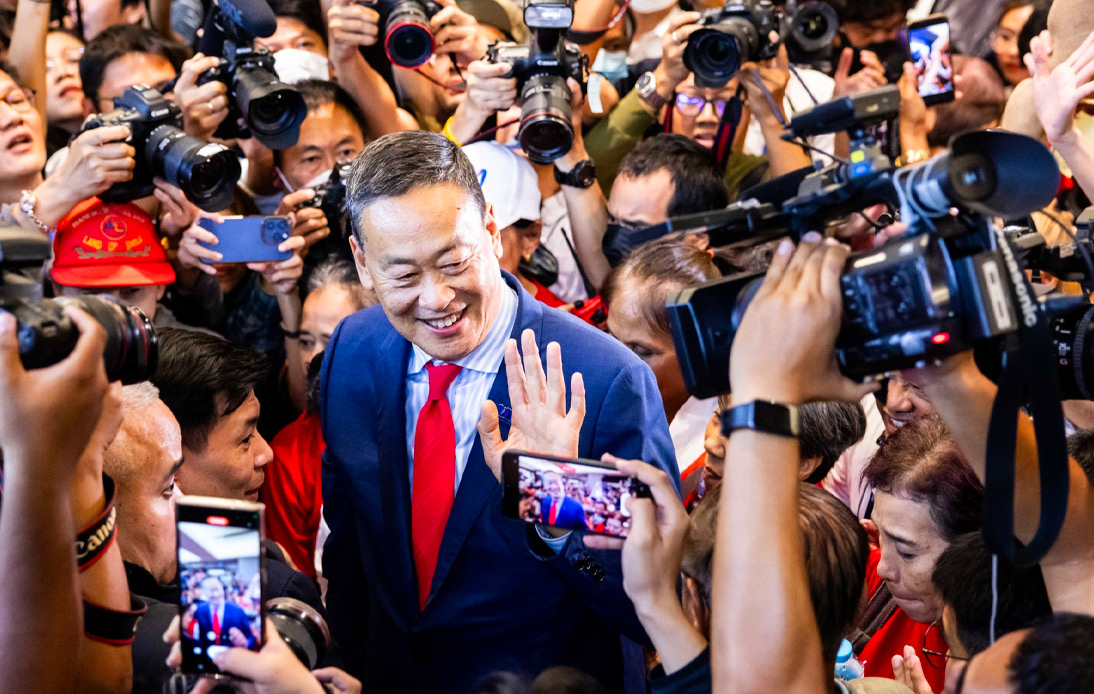
The newly elected Thai Prime Minister, Srettha Thavisin from the Pheu Thai Party, is set to get a royal endorsement from King Maha Vajiralongkorn this Wednesday evening, which signifies the formal appointment of the nation’s 30th prime minister.
The forthcoming administration, directed by the 61-year-old real estate magnate, will face a range of issues, from the slowing Thai economy to power dynamics in the dominant coalition.
Here are five things to know about the new government led by Srettha:
When will the new government be formed?
After the royal endorsement on Wednesday, Srettha will step into his role as prime minister, and subsequently, his team of cabinet members will be introduced.
The configuration of the administration and the roster of cabinet members has been a topic of conversation over the past weeks, stemming from talks between Pheu Thai and their coalition allies.
Though the coalition has settled on the division of ministerial positions, with Pheu Thai securing eight, the specifics about which party gets which ministry are still under deliberation.
What principal policies does the next government uphold?
Shortly after being elected as the upcoming prime minister, one key policy of Srettha’s that garnered renewed interest was his promise to deposit 10,000 baht ($286) to the digital wallets of individuals older than 16, intended to be utilized in local stores within “a 4-kilometer radius” of the recipients.
This strategy is devised to spur consumer expenditure, especially in the countryside, to counteract the slow economy.
Another policy that has raised concerts from the business community is the proposed increase in the daily minimum wage to 600 baht, almost twice the existing 300 to 330.
This could lead to elevated production costs in major industries, potentially diminishing the competitive advantage of Thai goods in the global trading arena.
What are the challenges for the next government?
A major challenge for the new administration is the revival of the economy, which hasn’t shown as much progress as hoped, primarily due to the gloomy global economic landscape and China’s downturn impacting Thailand’s export demand.
Other pressing concerns include the rising costs of energy, which have put a strain on the economy, escalating prices from power to commodities to transportation.
Domestically, ensuring the cohesive stability of the ruling coalition remains a key theme.
The Pheu Thai-led 11 party coalition encompasses two pro-military parties that historically disagreed with Pheu Thai. Harmonizing democratic and conservative parties is vital for the incoming government.
How will the leadership transition influence other nations?
The electoral process in Thailand has been under international observation for the past three months following the May 14 polls, especially among Thailand’s neighboring countries in the Association of Southeast Asian Nations.
Thailand’s active collaborations with its ASEAN counterparts span multiple domains from commerce and investing to energy and environment.
Countries within ASEAN and other partners in the Asia-Pacific zone are keenly observing potential impacts of the new Thai leadership and its strategies on existing collaborative endeavors and commerce and investment talks.
Key points of interest include Thailand’s diplomatic stance concerning Myanmar and the ongoing talks with Cambodia about mutual development of gas resources in the overlapping territories in the Gulf of Thailand.
What’s the business community’s perspective?
The corporate world has positively received the much-anticipated new leadership, given there are pressing economic challenges that the upcoming prime minister must address swiftly to restore investor trust.
Kriengkrai Thiennukul, who leads the Federation of Thai Industries, expressed that the business community is optimistic about having a new leader who is believed to have expertise and knowledge in economic challenges.
This could assist the country in addressing enduring economic hurdles, expressed Kriengkrai.
Kriangkrai communicated to the media, “We hope the new government will rush to solve key issues such as falling exports, rising energy costs, (small and medium-size enterprises)’ liquidity crunch and household debt.”




















